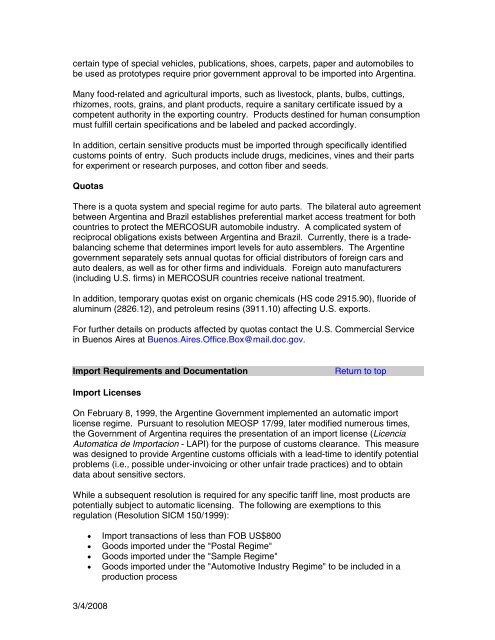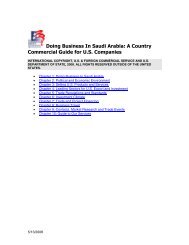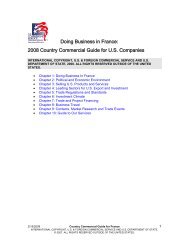You also want an ePaper? Increase the reach of your titles
YUMPU automatically turns print PDFs into web optimized ePapers that Google loves.
certain type of special vehicles, publications, shoes, carpets, paper and automobiles to<br />
be used as prototypes require prior government approval to be imported into <strong>Argentina</strong>.<br />
Many food-related and agricultural imports, such as livestock, plants, bulbs, cuttings,<br />
rhizomes, roots, grains, and plant products, require a sanitary certificate issued by a<br />
competent authority in the exporting country. Products destined for human consumption<br />
must fulfill certain specifications and be labeled and packed accordingly.<br />
<strong>In</strong> addition, certain sensitive products must be imported through specifically identified<br />
customs points of entry. Such products include drugs, medicines, vines and their parts<br />
for experiment or research purposes, and cotton fiber and seeds.<br />
Quotas<br />
There is a quota system and special regime for auto parts. The bilateral auto agreement<br />
between <strong>Argentina</strong> and Brazil establishes preferential market access treatment for both<br />
countries to protect the MERCOSUR automobile industry. A complicated system of<br />
reciprocal obligations exists between <strong>Argentina</strong> and Brazil. Currently, there is a tradebalancing<br />
scheme that determines import levels for auto assemblers. The Argentine<br />
government separately sets annual quotas for official distributors of foreign cars and<br />
auto dealers, as well as for other firms and individuals. Foreign auto manufacturers<br />
(including U.S. firms) in MERCOSUR countries receive national treatment.<br />
<strong>In</strong> addition, temporary quotas exist on organic chemicals (HS code 2915.90), fluoride of<br />
aluminum (2826.12), and petroleum resins (3911.10) affecting U.S. exports.<br />
For further details on products affected by quotas contact the U.S. Commercial Service<br />
in Buenos Aires at Buenos.Aires.Office.Box@mail.doc.gov.<br />
Import Requirements and Documentation Return to top<br />
Import Licenses<br />
On February 8, 1999, the Argentine Government implemented an automatic import<br />
license regime. Pursuant to resolution MEOSP 17/99, later modified numerous times,<br />
the Government of <strong>Argentina</strong> requires the presentation of an import license (Licencia<br />
Automatica de Importacion - LAPI) for the purpose of customs clearance. This measure<br />
was designed to provide Argentine customs officials with a lead-time to identify potential<br />
problems (i.e., possible under-invoicing or other unfair trade practices) and to obtain<br />
data about sensitive sectors.<br />
While a subsequent resolution is required for any specific tariff line, most products are<br />
potentially subject to automatic licensing. The following are exemptions to this<br />
regulation (Resolution SICM 150/1999):<br />
3/4/2008<br />
Import transactions of less than FOB US$800<br />
Goods imported under the "Postal Regime"<br />
Goods imported under the "Sample Regime"<br />
Goods imported under the "Automotive <strong>In</strong>dustry Regime" to be included in a<br />
production process












